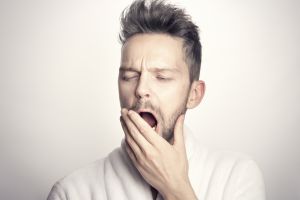Template:Did you know: Difference between revisions
Jump to navigation
Jump to search
(Created page with " <h2 style="margin:0;background-color:#dcdcdc;font-size:120%;font-weight:bold;border:1px solid #fafe1e;text-align:left;color:#000;padding:0.2em 0.4em;">Did you know?</h2> * Sleeping on the right side can help reduce snoring. * The average person spends around one-third of their life asleep. * Lack of sleep can affect our ability to concentrate, impair our judgment, and affect our mood. * The brain continues to be active while we sleep, processing and organizing infor...") |
No edit summary |
||
| Line 1: | Line 1: | ||
<h2 style="margin:0;background-color:#dcdcdc;font-size:120%;font-weight:bold;border:1px solid #fafe1e;text-align:left;color:#000;padding:0.2em 0.4em;">Did you know?</h2> | <h2 style="margin:0;background-color:#dcdcdc;font-size:120%;font-weight:bold;border:1px solid #fafe1e;text-align:left;color:#000;padding:0.2em 0.4em;">Did you know?</h2> | ||
[[File:Man-sleepy-tired.jpg|thumb|sleepy man]] | |||
* Sleeping on the right side can help reduce [[snoring]]. | * Sleeping on the right side can help reduce [[snoring]]. | ||
* The average person spends around one-third of their life asleep. | * The average person spends around one-third of their life asleep. | ||
Latest revision as of 20:53, 4 February 2023
Did you know?
- Sleeping on the right side can help reduce snoring.
- The average person spends around one-third of their life asleep.
- Lack of sleep can affect our ability to concentrate, impair our judgment, and affect our mood.
- The brain continues to be active while we sleep, processing and organizing information from the day.
- REM sleep (Rapid Eye Movement) is the stage when most dreaming occurs.
- The sleep-wake cycle is regulated by our circadian rhythm, a natural internal process that controls the timing of sleep and wakefulness.
- Lack of sleep has been linked to various health problems, including obesity, heart disease, and depression.
- Studies have shown that people who sleep for shorter periods of time tend to have higher levels of stress and anxiety.
- The amount of sleep needed can vary from person to person, but the average adult needs around 7-9 hours of sleep per night.
- There are over 80 different sleep disorders, including insomnia, sleep apnea, and restless leg syndrome.
